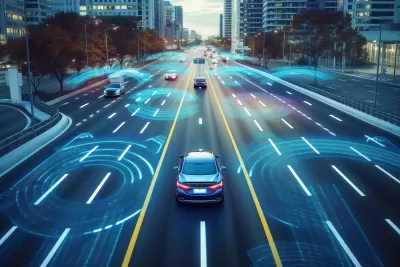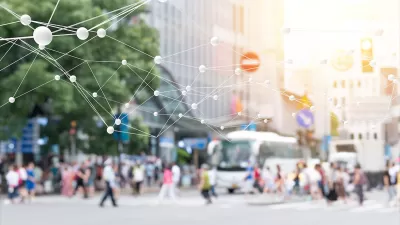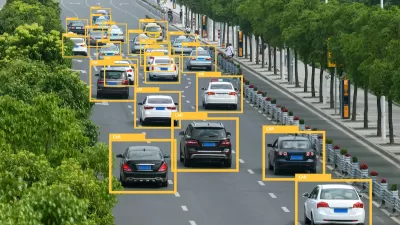Experts from Forbes compiled a list of technologies they say will have the greatest impact on urban living, and several of them will have major impacts on urban planning practice.

In a recent Forbes article, experts on its Technology Council pulled together a list of smart city technologies they say will transform urban living in the not-so-distant future. “Advances in managing everything from transportation to waste management promise to have a significant impact on residents and businesses, improving everyone’s overall quality of life,” the article reads.
Of the 19 trends identified, here are the 12 that have the most relevance to urban planners and related professionals:
- Autonomous vehicles “will transform mobility.”
- “Cognitive cities” technology powered by AI will make “concepts such as ‘smart cities as a service’ a reality.”
- Geolocation data will help cities enhance services for taxpayers and allow for better resource planning for businesses.
- “Context aware” computing that uses AI to build upon the Internet of Things will allow smart cities ”to be able to react more quickly and accurately to user needs and intents.”
- Air taxis have the potential to support urban development, reduce traffic congestion, and drastically reduce the delivery of emergency and medical supplies.
- AI-powered public transit will allow for “dynamically adjusting routes and schedules based on real-time data to minimize wait times and maximize efficiency.”
- Flexible workplaces and “pilot labs” may fill some of vacant commercial spaces cities are currently struggling with.
- Intelligent waste management will “monitor waste levels, optimize collection routes and enhance recycling. This reduces fuel consumption, lowers carbon emissions and minimizes landfill use.”
- Automated public transit payment systems will increase convenience of public transit for users.
- Intelligent traffic management systems will “use real-time data and advanced technology to improve traffic flows, reduce congestion and make public transportation more efficient.”
- Smart parking systems will “use sensors, cameras and data analytics to provide real-time information on parking space availability,” allowing drivers to “use mobile apps to find and reserve available parking spots, reducing the time spent searching for parking and decreasing traffic congestion.”
- Micro-mobility hubs will integrate electric bikes, scooters and car-sharing options, all accessible via a unified digital platform.
For the full list of 19 trends, check out the original Forbes article linked below.
FULL STORY: 19 Smart City Technologies And How They’ll Transform Urban Living

Manufactured Crisis: Losing the Nation’s Largest Source of Unsubsidized Affordable Housing
Manufactured housing communities have long been an affordable housing option for millions of people living in the U.S., but that affordability is disappearing rapidly. How did we get here?

Americans May Be Stuck — But Why?
Americans are moving a lot less than they once did, and that is a problem. While Yoni Applebaum, in his highly-publicized article Stuck, gets the reasons badly wrong, it's still important to ask: why are we moving so much less than before?

Research Shows More Roads = More Driving
A national study shows, once again, that increasing road supply induces additional vehicle travel, particularly over the long run.

Judge Halts Enforcement of Anti-Homeless Laws in Grants Pass
The Oregon city will be barred from enforcing two ordinances that prosecute unhoused residents until it increases capacity and accessibility at designated camping sites.

Advancing Sustainability in Los Angeles County Schools
The Los Angeles County Office of Education’s Green Schools Symposium brings together educators, students, and experts to advance sustainability in schools through innovative design, climate resilience strategies, and collaborative learning.

Using Old Oil and Gas Wells for Green Energy Storage
Penn State researchers have found that repurposing abandoned oil and gas wells for geothermal-assisted compressed-air energy storage can boost efficiency, reduce environmental risks, and support clean energy and job transitions.
Urban Design for Planners 1: Software Tools
This six-course series explores essential urban design concepts using open source software and equips planners with the tools they need to participate fully in the urban design process.
Planning for Universal Design
Learn the tools for implementing Universal Design in planning regulations.
City of Moreno Valley
Institute for Housing and Urban Development Studies (IHS)
City of Grandview
Harvard GSD Executive Education
NYU Wagner Graduate School of Public Service
City of Cambridge, Maryland
Newport County Development Council: Connect Greater Newport





























